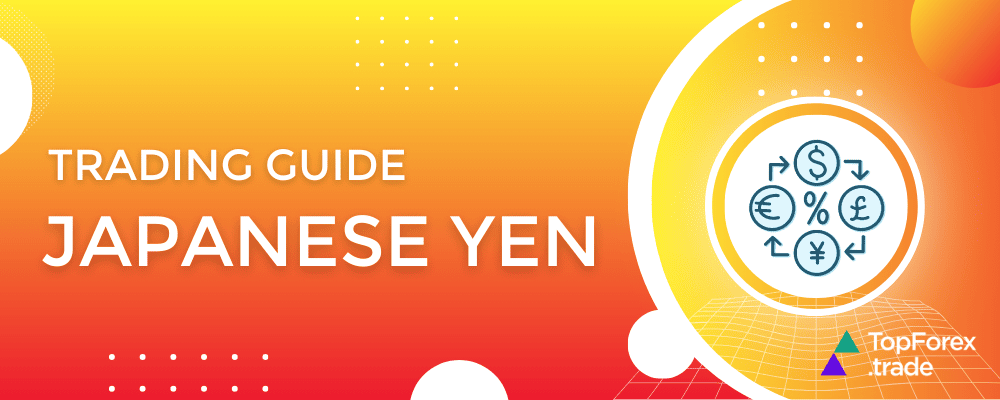Japanese Yen trading guide: economic factors and recommended Forex brokers

The Japanese Yen (JPY) is one of the most traded currencies in the world, playing a pivotal role in the global foreign exchange market. As the official currency of the third-largest economy, the Yen is highly liquid and widely used in international trade, particularly in Asia. Given its deep integration into global financial systems, its significance extends beyond Japan, especially as a counterbalance to major currencies like the U.S. dollar and the Euro.
One of the defining characteristics of the Yen is its status as a safe-haven currency, meaning that during periods of economic uncertainty, geopolitical tensions, or financial market volatility, investors often flock to the Yen as a store of value. This stems from Japan’s robust current account surplus and financial stability, making the Yen less susceptible to major shocks than other currencies.
Understanding the key factors that drive the Japanese Yen’s movements is crucial for successful forex trading. Domestic economic indicators, global risk sentiment, and external factors such as trade relations and commodity prices all play a role in influencing Yen’s value. By staying informed on these elements, traders can better navigate the volatility of the currency market when dealing with the Yen.
Economic indicators impacting the Yen price

- Bank of Japan (BoJ) Monetary Policy
The Bank of Japan (BoJ) plays a pivotal role in shaping the direction of the Japanese Yen through its monetary policy decisions. The BoJ has long pursued an ultra-loose monetary policy, characterized by negative interest rates and quantitative easing (QE) programs aimed at boosting inflation and stimulating economic growth. By keeping interest rates in negative territory, the BoJ effectively makes the Yen less attractive to investors seeking higher yields, leading to a weaker Yen in global markets.
However, the Yen’s safe-haven status complicates this relationship, as periods of global uncertainty can cause a surge in demand for the currency, even when domestic interest rates are low. Traders closely watch the BoJ’s meetings for signs of any shift in policy, especially if the central bank signals an end to its aggressive easing or moves toward interest rate normalization. Any such shift could lead to a stronger Yen, as it would make Japanese assets more appealing to foreign investors.
- Inflation data
Inflation is another critical factor influencing the value of the Yen. Japan has historically struggled with deflation, or falling prices, which has prompted the BoJ to implement policies to boost inflation to its 2% target. Low inflation or deflation generally weakens the Yen, as it signals that economic demand is sluggish, prompting further monetary easing by the BoJ.
Conversely, rising inflation pressures the BoJ to consider tightening monetary policy, which could strengthen the Yen. Traders keep a close eye on key inflation metrics, such as the Consumer Price Index (CPI), as these provide insight into the likelihood of changes in monetary policy. If inflation moves closer to the BoJ’s target, the expectation of reduced easing could push the Yen higher.
Trading the USD/JPY can be complex, but understanding key indicators of Technical analysis and charting techniques can simplify the process. This guide covers essential aspects like price movements, momentum, and volatility, offering practical tips for making informed trading decisions.
Recommended reading: How to trade USD/JPY: key indicators, chart analysis, and Best FX brokers
- GDP and Economic growth
Japan’s Gross Domestic Product (GDP), which measures the country’s overall economic performance, also has a direct impact on the Yen. Strong GDP growth typically boosts investor confidence in the Yen, as it indicates a healthy economy with robust production and consumer demand. A growing economy may also lead the BoJ to consider raising interest rates, making the Yen more attractive.
On the other hand, sluggish GDP growth or contraction can weaken the Yen, as it signals underlying economic problems that could lead to further monetary easing or fiscal stimulus. Traders often look at quarterly GDP releases as a key indicator of economic health, factoring in how it may influence future BoJ actions and, consequently, the Yen’s direction in the Forex market.
Global factors affecting Yen movements

Risk sentiment
The Japanese Yen is widely known as a **safe-haven currency**, meaning its value often appreciates during periods of global uncertainty or financial market turbulence. When investors are worried about geopolitical events, economic downturns, or sharp stock market declines, they tend to move their capital into safer assets, and the Yen becomes one of the top choices. This dynamic often leads to Yen strength, even when Japan’s domestic economy might not be performing strongly. For example, during major crises like the 2008 financial meltdown or the COVID-19 pandemic, the Yen appreciated as investors sought safety.
However, during times of economic optimism and risk appetite, when investors are more willing to put their money into higher-yielding assets, the demand for the Yen may decline, leading to its depreciation. This connection between risk sentiment and Yen movement is a critical consideration for traders when making decisions in volatile markets.
The US-Japan Relations
The relationship between the United States and Japan, especially in terms of trade policy, plays a significant role in the movement of the JPY/USD currency pair. The U.S. is one of Japan’s largest trading partners, and shifts in trade agreements, tariffs, or diplomatic relations can have direct effects on the Yen. For example, tensions over trade deficits or negotiations over tariffs on Japanese goods can impact investor sentiment toward the Yen.
Moreover, U.S. economic performance, particularly changes in interest rates by the Federal Reserve, can also significantly impact the Yen. If the U.S. raises interest rates, investors might flock to the dollar for better returns, leading to a weakening Yen. Conversely, dovish signals from the Fed could lead to Yen strength as the gap between U.S. and Japanese interest rates narrows.
Commodity prices
Japan is heavily reliant on imports for its energy needs, particularly oil. Since Japan lacks domestic energy resources, it must import the majority of its crude oil. As a result, fluctuations in commodity prices, especially oil, can greatly affect the Yen. When oil prices rise, Japan’s trade balance can worsen, as the cost of importing energy increases. This often leads to a weaker Yen, as Japan needs to exchange more currency to cover its import costs.
On the flip side, when oil prices fall, Japan’s import costs decline, which can strengthen the Yen. Additionally, lower oil prices tend to reduce inflationary pressures in Japan, which may affect BoJ’s monetary policy stance. This makes commodity price trends a key variable in Yen trading strategies.
The impact of natural disasters
Japan is highly susceptible to natural disasters such as earthquakes, tsunamis, and typhoons, which can have both short- and long-term effects on the economy and, by extension, the Yen. In the immediate aftermath of a disaster, there is often a temporary weakening of the Yen as investors anticipate economic disruption, supply chain breakdowns, and increased government spending for reconstruction efforts. The 2011 Tōhoku earthquake and tsunami, for instance, caused significant volatility in the Yen and Japanese financial markets.
However, in some cases, the Yen can strengthen in the longer term as Japan receives large inflows of capital from insurance payouts and foreign aid, or as global risk sentiment drives investors into safe-haven assets. Additionally, post-disaster reconstruction efforts can stimulate economic activity, which may lead to an appreciation of the Yen.
Trading the Japanese Yen with leading Forex brokers

When trading the Japanese Yen (JPY), it’s essential to partner with a reliable and reputable broker that offers the tools, resources, and favorable trading conditions to maximize your success. Brokers like the ones mentioned below provide excellent platforms for trading JPY pairs, offering competitive spreads, advanced trading features, and robust educational resources. Here’s how these brokers can enhance your JPY trading experience:
AvaTrade Japanese Yen (JPY) trading
AvaTrade offers a comprehensive range of forex pairs, including major Yen pairs like USD/JPY and EUR/JPY, with tight spreads and flexible leverage. One of AvaTrade’s standout features is its automated trading capabilities, which can be particularly useful for traders who use technical indicators like moving averages or RSI to develop algorithm-based strategies for Yen pairs. Additionally, AvaTrade’s advanced charting tools and educational content make it easier for traders to implement both technical and fundamental analysis when navigating Yen market movements.
XTB Japanese Yen (JPY) trading
XTB is known for its intuitive and powerful xStation platform, which provides cutting-edge charting tools, enabling traders to easily analyze technical indicators like support/resistance levels or moving averages. XTB also offers free educational resources, market analysis, and research tools, which are invaluable for keeping track of economic events like Bank of Japan (BoJ) announcements or inflation data that impact the Yen. The combination of low spreads and fast trade execution makes XTB a great choice for traders looking to capitalize on short-term Yen movements in volatile markets.
Exness Japanese Yen (JPY) trading
Exness stands out with its ultra-tight spreads, particularly on JPY pairs like USD/JPY and GBP/JPY. Exness offers various account types, including zero-spread accounts, which can be beneficial for traders executing high-frequency or large-volume trades. The broker’s fast execution speeds and the ability to trade with nano lots allow beginners and experienced traders alike to manage risk effectively when trading Yen, especially in volatile periods where quick entries and exits are crucial.
XM Japanese Yen (JPY) trading
XM is renowned for its customer-friendly approach, offering zero-commission accounts and tight spreads on major Yen pairs. XM provides traders with multiple platforms, including MT4 and MT5, known for their technical analysis capabilities. With XM’s extensive educational offerings, traders can easily stay informed about the global and local factors affecting the Yen, such as oil price fluctuations or Japan’s economic growth figures. The broker also offers flexible leverage options, allowing traders to customize their risk levels when trading volatile Yen pairs
.
Partnering with brokers like AvaTrade, XTB, Exness, and XM gives traders access to essential tools and market conditions that enhance their ability to profit from Yen market movements. Whether you prefer short-term technical trading or longer-term position strategies, these brokers provide the platforms, tight spreads, and educational resources needed to make informed and timely trading decisions.
Related articles:
How to trade the Japanese Yen - FAQ